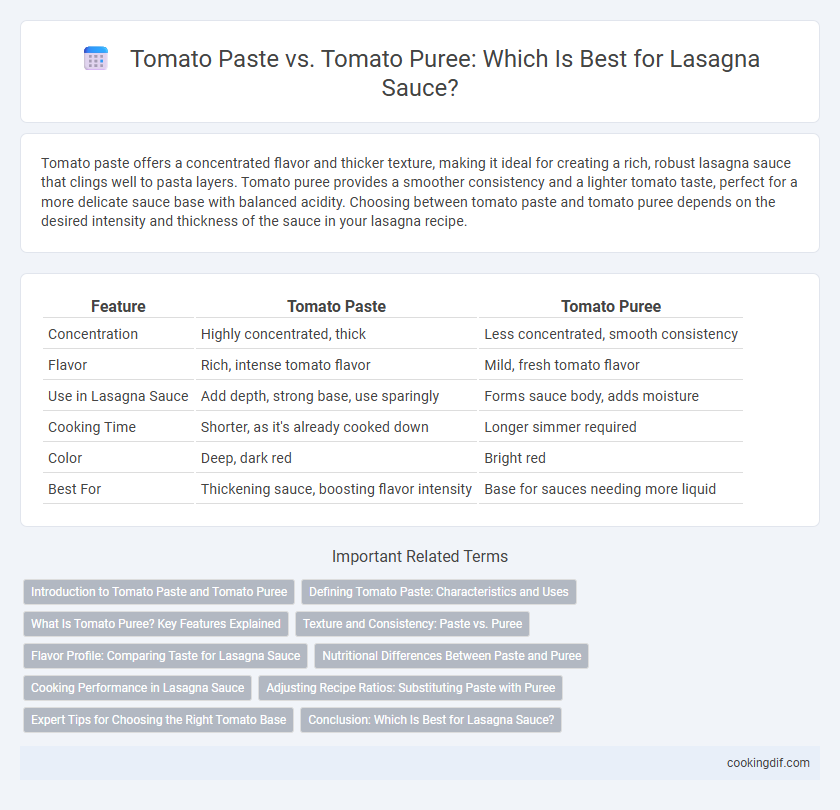Tomato paste offers a concentrated flavor and thicker texture, making it ideal for creating a rich, robust lasagna sauce that clings well to pasta layers. Tomato puree provides a smoother consistency and a lighter tomato taste, perfect for a more delicate sauce base with balanced acidity. Choosing between tomato paste and tomato puree depends on the desired intensity and thickness of the sauce in your lasagna recipe.
Table of Comparison
| Feature | Tomato Paste | Tomato Puree |
|---|---|---|
| Concentration | Highly concentrated, thick | Less concentrated, smooth consistency |
| Flavor | Rich, intense tomato flavor | Mild, fresh tomato flavor |
| Use in Lasagna Sauce | Add depth, strong base, use sparingly | Forms sauce body, adds moisture |
| Cooking Time | Shorter, as it's already cooked down | Longer simmer required |
| Color | Deep, dark red | Bright red |
| Best For | Thickening sauce, boosting flavor intensity | Base for sauces needing more liquid |
Introduction to Tomato Paste and Tomato Puree
Tomato paste is a concentrated form of tomatoes, cooked down to a thick consistency with intense flavor and richness, making it ideal for building deep, robust lasagna sauces. Tomato puree, on the other hand, is smoother and less concentrated than tomato paste, retaining more liquid and a fresher tomato taste, often used to create a lighter base with a balanced texture. Understanding the distinct characteristics of tomato paste and puree helps in achieving the perfect sauce consistency and flavor profile in authentic lasagna recipes.
Defining Tomato Paste: Characteristics and Uses
Tomato paste is a highly concentrated tomato product made by cooking tomatoes for several hours to reduce moisture, resulting in a thick, intensely flavored, and vibrant red paste ideal for enriching lasagna sauces with robust umami depth. It contains less water and a higher solid content than tomato puree, making it perfect for thickening sauces and providing a rich tomato base without dilution. Using tomato paste in lasagna sauce enhances the intensity of tomato flavor, contributing to a hearty and savory dish.
What Is Tomato Puree? Key Features Explained
Tomato puree is a thick, smooth sauce made from cooked and strained tomatoes, offering a rich, concentrated flavor ideal for lasagna sauce. It typically contains less water than tomato paste, providing a balanced consistency that enhances the sauce without overpowering other ingredients. Its natural sweetness and mild acidity make tomato puree a versatile base for layering flavors in lasagna.
Texture and Consistency: Paste vs. Puree
Tomato paste offers a thick, concentrated texture that intensifies lasagna sauce, providing a rich and robust consistency ideal for binding layers without excess liquid. Tomato puree, with its smoother and more fluid texture, yields a lighter sauce that can introduce moisture and softness to the dish, preventing dryness. Choosing between paste and puree impacts the sauce's body, affecting how well it adheres to pasta and melds with other ingredients in the lasagna.
Flavor Profile: Comparing Taste for Lasagna Sauce
Tomato paste delivers a rich, concentrated tomato flavor with a slightly sweet and tangy profile ideal for deepening the sauce in lasagna. Tomato puree offers a smoother, milder taste with a balanced acidity that enhances the sauce's freshness without overpowering other ingredients. Choosing between tomato paste and puree depends on whether a robust, intense flavor or a light, fresh tomato essence is desired for the lasagna sauce.
Nutritional Differences Between Paste and Puree
Tomato paste contains a higher concentration of vitamins A and C, lycopene, and antioxidants due to its reduced water content, providing a more nutrient-dense option for lasagna sauce. Tomato puree, while less concentrated, retains more natural sugars and a milder acidity, offering a balanced flavor with moderate nutrient levels. Choosing tomato paste enhances the sauce's nutrient density, whereas puree delivers a smoother texture with slightly fewer calories and vitamins.
Cooking Performance in Lasagna Sauce
Tomato paste offers a concentrated flavor and thick texture, making it ideal for creating a robust, rich lasagna sauce that holds well between pasta layers. Tomato puree provides a smoother consistency with a lighter tomato flavor, which can result in a thinner sauce that may require longer cooking to reduce. For optimal cooking performance in lasagna, tomato paste ensures a denser sauce, enhancing the overall texture and preventing sogginess.
Adjusting Recipe Ratios: Substituting Paste with Puree
Tomato paste and tomato puree differ in concentration, with paste being thicker and more intense in flavor, requiring adjustments when substituting in lasagna sauce recipes. When replacing tomato paste with puree, use approximately three times the amount of puree to match the richness and depth of flavor. Reducing the added liquid in the recipe compensates for puree's higher water content, ensuring the sauce maintains the desired consistency.
Expert Tips for Choosing the Right Tomato Base
Tomato paste offers a rich, concentrated flavor ideal for a thick lasagna sauce, while tomato puree provides a smoother texture with a balanced acidity, perfect for a lighter base. Experts recommend using tomato paste when aiming for intensity and depth, whereas tomato puree suits recipes requiring a more fluid consistency. Selecting the right tomato base depends on desired sauce thickness and flavor concentration to complement the layers of cheese and pasta.
Conclusion: Which Is Best for Lasagna Sauce?
Tomato paste provides a rich, concentrated flavor and thicker consistency that enhances the depth of lasagna sauce, making it ideal for slow-cooked recipes. Tomato puree offers a lighter texture and fresher taste but can result in a thinner sauce that may require additional cooking time to thicken. For the best lasagna sauce, tomato paste is preferred due to its intensity and ability to create a robust, hearty base.
Tomato Paste vs Tomato Puree for sauce Infographic

 cookingdif.com
cookingdif.com